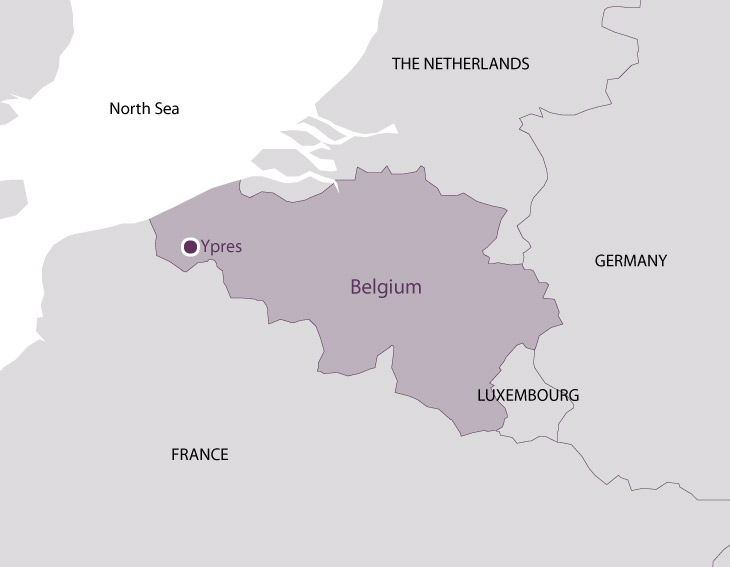Overview
There were four major battles at Ypres between October 1914 and April 1918. The first was a powerful German offensive to take the town during the last week of October and the first week of November 1914 in an attempt to thrust towards the channel ports.
The Second Battle of Ypres began on 12th April 1915 with a strong German attack to the north; the British replied with an attack successfully capturing Hill 60. On 22nd April the Germans used poisonous gas for the first time on the Western Front.
The lull between June 1915 and June 1917 was in fact an artillery duel, with both sides attempting to destroy the other’s defensive positions. The consequence was the almost total destruction of the magnificent town, in the Middle Ages a leading centre of cloth manufacture.
On June 7th 1917 the Third Battle of Ypres commenced. Known today as ‘Passchendaele’, this series of limited objective attacks on the German positions, using lessons learned from the attacks on the Somme in 1916, saw Ypres finally being relieved from threat.
The Battle of Messines started this offensive with the exploding of nineteen huge mines under the German lines. On November 6th the Passchendaele Ridge was finally cleared by British and Canadian troops. The cost of victory was extremely high as visits to Tyne Cot Cemetery, Langemark and the Menin Gate will illustrate.
In 1918 the Germans, in one last effort to achieve victory, swept through this area in a matter of days, and although they advanced as far as Kemmel, Ypres managed to hold out.
This tour studies trench warfare and follows the fronts of both Allied and German forces. Through walking the scarred landscape of Ypres, personal and moving stories of individuals caught up in the war, whether as soldiers or civilians, are uncovered and expertly recounted by Andrew Spooner, a military historian with over twenty years experience of leading tours to the region.
Day 1
Spanbroekmoelen, Bayernwald. Travel by coach at 7.30am from central London to Dover for the 1 hour 30 minute ferry crossing to Calais. Walk the battlefield, including Spanbroekmoelen and Bayernwald, for an introduction to the landscape and environment. Continue to Ypres for the first of three nights.
Day 2
Zonnebeke, Potijze, Zillebeke. Early visit of the museum at Zonnebeke followed by a visit of Hussar Farm, a former 19th-century farmhouse concreted over by the Royal Engineers and used as an artillery post. The rest of the morning is spent at Hell Fire Corner on the Menin Road and walking the original frontline from Spoilbank Cemetery towards the Bluff. After lunch continue the walk towards Caterpillar, Hill 60 and Larch Wood.
Day 3
Zonnebeke, Broodseinde, Langemark, Boezinge, Ypres. Walk from Zonnebeke Railway Station to the Tyne Cot Military Cemetery observing examples of the change from rigid trench warfare to defence by following an Australian Battalion along the former railway line. Experience the direct contrast of the German Cemetery at Langemark before visiting Essex Farm and exploring the medical and evacuation services. Return late afternoon to the hotel in order to attend the Menin Gate Ceremony (there will be an opportunity to lay a wreath of poppies). Final night in Ypres.
Day 4
Kemmel, Poperinge. Morning visit of Kemmel to investigate the practice of execution of deserters before visiting Talbot House, the sanctuary established by Gilbert and Neville Talbot for soldiers seeking peace and rest from the Great War. Drive to Calais for the Eurotunnel journey to London, arriving c. 7.00pm.
Price
£1,180. This includes: private coach travel for transfers and excursions; hotel accommodation as described below; breakfasts, 3 lunches and 3 dinners with wine, water and coffee; all admissions to museums visited by the group; all gratuities for restaurant staff, drivers; all taxes; the services of the lecturer and pre-tour personal research. Single supplement £140 (double room for single occupancy).
Accommodation
Novotel Centrum, Ypres: a 3-star hotel located near the Menin Gate.
How strenuous?
There is quite a lot of walking, most of it over rough ground and standing for long periods of time.
Are you fit enough to join the tour?
Group size
Between 10 and 22 participants.
Travel advice
Before booking, please refer to the FCDO website to ensure you are happy with the travel advice for the destination(s) you are visiting.

'Well designed for a four day experience.'
'The lecturer was first class. He is an excellent communicator and an amiable companion.'
'We learned such an enormous amount from the lecturer, who could not have been a more informative and helpful guide.'
'I had provided the lecturer with some family history before the tour, which he researched further and wove into one of the day's itineraries. He did this for other participants as well which gave the tour such a personal touch.'
